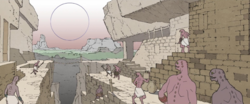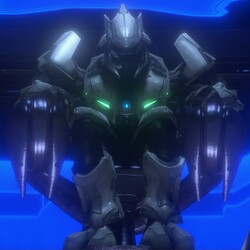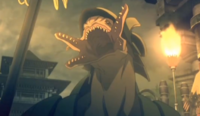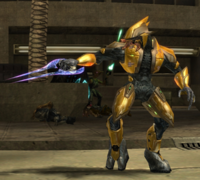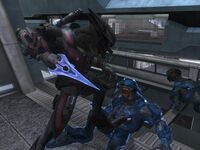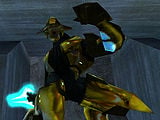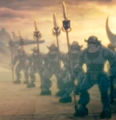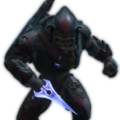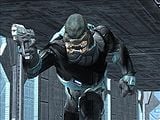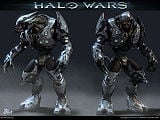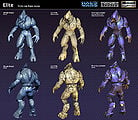Sangheili
From Halopedia, the Halo wiki
| This article does not have enough inline citations and/or does not adhere to the proper citation format. You can help Halopedia by adding citations. |
| This article does not meet the wiki's general standards and/or standards on layouts. You can help by cleaning this article. |
- "On the blood of our fathers, on the blood of our sons... We swore to uphold the Covenant!"
- — Rtas 'Vadumee before the Battle of the Threshold gas mine.
The Sangheili[1] (Latin Macto cognatus[2], meaning "I glorify my kin") are a saurian[3] species of fierce, proud, strong, agile and intelligent warriors and innovative strategists. Sangheili are named after their home planet, Sanghelios. Known to humans as Elites[4], due to their adeptness and skill in military strategy, the Sangheili formed the military backbone of the Covenant for almost the entirety of its existence up until the Covenant civil war. They had a very strong rivalry with the Jiralhanae, which finally became open hatred during the Great Schism at the conclusion of the Human-Covenant War.
Originally a founding species of the unified conglomerate of races known as the Covenant, they later led the Covenant breakaway faction known as the Covenant separatists, who sided with the humans against their former allies, due to the fact that the Prophet of Truth and the Prophet of Mercy had ordered the genocide of the entire Sangheili race. This was established after the assassination of the Prophet of Regret at the hands of John-117. It was the Sangheili who were ultimately held responsible for the Prophet of Regret's death, and were seen as "unfit" to continue to guard the Prophets. The Prophets sought to achieve this through the use of the other Covenant races, primarily the Jiralhanae. The aftermath of the Great Schism formed the bedrock of the Covenant's ultimate collapse.
History
The Ark and reseeding
The Sangheili home world, Sanghelios, had at one point been visited by or had been in contact with the Forerunners. During the Forerunner-Flood war, the Librarian visited the planet to retrieve specimens of the Sangheili for preservation aboard Installation 00. After the firing of the Halo Array, they were returned to their home planet to begin re-building their culture.
Development of civilization and the Covenant
After being returned to their homeworld, the Sangheili discovered artifacts left by the Forerunners on their planet. The Sangheili revered the objects these "gods" had left, and considered tampering with them a heresy beyond any other. In 938 BCE they encountered the Reformist San 'Shyuum (who would later be known as "Prophets" by humans), a race who also worshiped the Forerunners as gods, but had utilized Forerunner technology for their own needs, believing the technology had been left behind by the Gods as gifts for their children. This sparked a war between the two races over how to treat the relics. Even though the Sangheili were much more physically imposing and numerous, they suffered extreme casualties under the sheer power of the San 'Shyuum's Dreadnought, a surviving Keyship, and by 876 BCE even the most devout had to admit their survival depended on the reconstitution of their own Forerunner technology. This, of course, led both sides to an agreement that ended with the decommissioning of the Forerunner Dreadnought and a shaky alliance that eventually expanded into the Covenant.
The San 'Shyuum helped assuage the Sangheili by informing them of the Great Journey: by seeking out the Holy Rings scattered throughout the galaxy and utilizing them, a Great Journey would begin. This Great Journey would transform believers into godlike beings, while providing salvation for their doomed existence of fighting with the Flood. The Sangheili then became the bodyguards of the physically less imposing Prophets, who would search the galaxy for the Halos.[5] The Writ of Union was drawn up in 852 BCE in order to codify the Covenant. Its first canto clearly outlines the nature of the Covenant from the perspective of the Prophets.
Being one of the few races in the Covenant to achieve space-faring status without outside intervention, Sangheili interaction with the San 'Shyuum was initially strained due to memories of the recent war. However, the two sides later formed a prosperous relationship, eventually laying the foundation for the modern Covenant hegemony.
During their membership in the Covenant, the Sangheili were simply put, technological and societal equals of the San 'Shyuum. However, for a significant period, they found themselves as the dominant military muscle for the entire Covenant structure - hardly surprising given the warlike, feudal nature of their homeworld, Sanghelios. What was surprising was the cyclical stability this feudal society was able to offer. Technological and medical advancement prospered, and the intelligent, aggressive Sangheili were peerless until they encountered the San 'Shyuum. With exchange of goods and ideas, the Sangheili adapted to and eventually embraced the Covenant religion, grafting its tenets to their own belief system.
Human-Covenant War
- Main article: Human-Covenant War
When the Prophets declared war on a previously unknown species called "humans", the Sangheili followed their lead without question. After a period of time, however, even though the Prophets insisted that the humans were "unclean beings" that must be eliminated from the galaxy, some seasoned Sangheili veterans began to question the refusal of the Prophets to even consider accepting the humans into the Covenant.[Notes 1][6] They seem to believe that humans, although physically weak, at least compared to themselves, are brave and even honorable. As such, these few Sangheili believed that humans should be offered admittance to the Covenant. Some even believed that the humans are equal to them - a considerable step for a Sangheili, or any member of the Covenant to make. These Sangheili admired how willing and brave the humans were when fighting to survive against outright extinction, they even respected to a certain degree those few soldiers who were willing to stay behind and cover their comrades from a Covenant attack. A few Sangheili even had more respect for the humans than they did for the San 'Shyuum before the Great Schism.
The Great Schism
- Main article: Great Schism
During the final months of the Human-Covenant War, the political shift caused by both the Prophet of Truth and Tartarus, the Chieftain of the Jiralhanae, started a slippery slope that ended in the dissolution of the Covenant between the Sangheili and the San 'Shyuum. Originally, the Jiralhanae were viewed as savagely aggressive and extremely goal-oriented, which the Sangheili viewed as a serious threat should the Brutes ever begin to desire political power. This fear became reality when the Honor Guards of the Prophets, originally an all-Sangheili class, was transformed into a duty of the Brutes. This was directly caused by the death of the Prophet of Regret at the hands of John-117, the human "Demon" known as the Master Chief, despite Regret's protection from his personal squad of Sangheili Honor Guardsman. Soon the Brutes found themselves in new positions of power, such as Field Masters, Ship Masters, and veritable replacements for the Sangheili. At the same time, during the Battle of Installation 05, Arbiter Thel 'Vadamee and Rtas 'Vadumee (both of which soon dropped the 'ee' suffix from their name to signify their abandonment of the Covenant) discovered the truth of the Halo rings from the Monitor 343 Guilty Spark and the deceit of the San 'Shyuum.
These events led the entire Sangheili species to secede from the Covenant, forming a faction of separatists. They were aided by a few of the member-races within the Covenant, such as many Unggoy and most Mgalekgolo, even though many apparently ended up siding with the Prophets despite the Sangheili's efforts. The secession included a movement to destroy the treacherous Brutes and Prophets, and the destruction of the Flood at all costs, eventually resulting in the Sangheili's alliance with the humans, persuaded by the Arbiter's counsel.
It is known that this civil war stretched from the human homeworld, Earth, all the way back to Sanghelios as the Sangheili attempted to wrest their share of the hegemony away from their new-found enemies. The Jiralhanae stepped in to fill the military void in ever increasing numbers, sensing the vacuum and opportunity left by the departure of the Sangheili.
Fall of the Covenant Empire
Finally, after the Battle of Earth, the Sangheili and humans managed to stop and subsequently kill the Prophet of Truth, effectively dissolving the Covenant. However, the Sangheili and humans were coerced to deal with a more massive threat; the Flood. Finally, the Arbiter and the Master Chief, after activating the newly constructed replacement Halo ring, effectively ended the Flood threat forever.
After the Human-Covenant War ended, there has been speculation of competition between the UNSC and the Sangheili, when it came to examining Forerunner ruins and relics like the Portal.[7] However, by March 2553, the Sangheili and humans remain friendly to one another as evidenced by the conversation between Thel 'Vadam and Lord Terrence Hood. All the Sangheili who fought in the Battle of Installation 00 agreed to depart Earth and return to their home planet, Sanghelios, to ensure its safety.
Following the destruction of the Covenant, Sangheili society plunged into crisis. They fractured into multiple infighting factions with varying ideas on how to run their society, despite their ongoing war with the Jiralhanae. This was largely due to the fact they had become reliant of the Prophets during the millennia of the Covenant's existence. As they regained their independence, they were forced to re-learn to manage their society on their own, without the direction of the Prophets or the manual labor provided by the other client races.[8] One faction, the Servants of Abiding Truth, opposed Thel 'Vadam's and his allies, specifically their rejection of the notion of the Forerunners being gods.[9]
As the Great Schism went on, the Sangheili continued their fight against the Jiralhanae. This was proving largely unsuccessful and the Sangheili were accepting serious losses. Without the Covenant to provide them with ships, technology, and repairs, they slowly lost warships and technologies they couldn't repair or replace. After the San 'Shyuum went into hiding, the Sangheili began to prevail against the Jiralhanae, who in turn began to fight amongst themselves. Having abandoned the Covenant, the Sangheili were now in a state of mass confusion in regards to their religion, because even though the San 'Shyuum lied to them, they had still given them purpose for their actions. Many Sangheili were still religiously devoted to the Forerunners and were attempting to uncover the meaning of their faith.[10]
Meanwhile, the UNSC, specifically the Office of Naval Intelligence, took advantage of this situation, attempting to keep the Sangheili splintered and disorganized by inciting the Servants of Abiding Truth to rebel against 'Vadam. This was to make sure the Sangheili would not pose a threat to humanity again, in spite of the Sangheili-human alliance.[11]
Description
Sangheili are at least 2.24 meters tall including helmet and armor, have two fingers and two thumbs on each hand which are much larger than human fingers and thumbs, which make the Sangheili look ungainly when wielding small human weapons such as the pistol. Their jaws are made up of four separate mandibles attached to their face, a more insect-like trait.
The Sangheili are attributed for great strength and intelligence, and are praised for their bravery and honor. Sangheili warriors augment these natural abilities further through use of energy shields integrated into their armor. Depending upon rank and mission objective, they are commonly seen in battle with Plasma Rifles, Covenant Carbines, Needlers, Type-31 Rifle and sometimes, if they are higher ranked, Energy Swords. Sangheili employ coffin-like orbital insertion pods as well as Phantom and Spirit Dropships for military transit purposes and rapid-response operations. Historically, Sangheili have followed the Covenant mentality of maintaining hatred towards humanity, believing them to be an affront to their religion and a challenge towards the Great Journey. However there are signs that this stance is being slowly abandoned as seen in the tentative alliance between the two enemies, forming the core allied faction at the end of Halo 2 and during Halo 3.
In Halo: Combat Evolved, upper ranks have a Forerunner symbol adorning their back. It is not known if the symbol varies from rank to rank. In Halo 3, Sangheili have Forerunner symbols on their arms and on the sides of their torso.
Anatomy and physiology
Sangheili are muscular and very tall, usually standing between 7'4" and 8'6".[12][13] Their jaws are quadruple-hinged, with an upper jaw and four mandible-like lips. With few exceptions, these mandibles are generally shown with six teeth each; many sources also depict an additional large fang on the tips of each mandible.[14][15] Anywhere from eight to ten broader teeth have been observed mounted on the central jaw structure. In Halo Wars and Halo: Reach, the Sangheili are depicted with more numerous, more feral-looking teeth. In the Halo Legends short The Duel, the Sangheili Han, Fal 'Chavamee, and Roh, keep their mandibles closed, using only the front two joints of their lower mandibles to speak, giving them a more humanoid appearance. While it may not actually be canon to the Halo franchise, it is possible that the Sangheili don't usually use all four of their mandibles, except when breathing heavily; an example would be during combat situations, though this has yet to be confirmed. Sangheili smell with the use of two nostrils, each a little in front and below the eye socket. Given their predatory nature, a Sangheili's sense of smell is likely very developed. Their hands are tetradactyl, having four digits; two middle fingers, and two opposing thumbs on the outside for grasping. Their legs are digitigrade, with short upper and lower legs, and elongated tarsals, using the distal and intermediate phalanges to support their weight when walking. This arrangement possibly allows them to run very quickly and jump large distances, compared to ordinary humans and other Covenant races.[16] Their superior agility may also be attributed to their homeworld's higher gravity; the additional strength required to move normally in a high-gravity environment would likely cause them to be more powerful in lower gravity situations. They also appear to have a double set of pectoral muscles, which contribute to their incredible strength.
Sangheili have a binary circulatory system[17][18] which circulates indigo-colored blood through their veins. It is assumed that they breathe oxygen, as they can breathe the same atmosphere as humans without any trouble, and their homeworld has a nitrogen-oxygen atmosphere, similar to Earth's.
Male Sangheili have grayish-brown skin; the majority of Sangheili have either dark blue, black, or brown eyes, although there are a few exceptions. It has been theorized that some Sangheili seem to have dark eyes because they wear eye coverings, which provide their heads-up displays. This hypothesis comes largely from the Arbiter's appearance - when standing before the High Council in his armor, his eyes were dark, but after his armor was removed, his eyes became a much lighter brown. Sangheili have laterally-positioned eyes with slit-shaped pupils, large irises, and horizontal eyelids, though these traits can only be seen in Halo 3
Sangheili are oviparous, laying eggs rather than giving live birth, and incubate their recently-hatched young in tank-like pods.[19]
Intelligence
- "Although Elites are naturally very intelligent, their culture's long dependence on a military-industrial schema has led to an emphasis on might over science. In some regards, the advent of the Covenant made this position easier-allowing the Elites to concentrate even more singularly on military endeavors, while Prophets took care of science and technology."
- — 343 Guilty Spark in the Bestiarum
The Sangheili are fairly intelligent and are able to demonstrate this in combat. Sangheili are normally on the move when fighting, constantly running and ducking, strafing and dodging when firing at the enemy. When presented with an obstacle, such as a Warthog driving at them, they will move out of the way, and if a vehicle stops, they will attempt to board it or disable it. It should be noted that not all Sangheili make use of cover because of their superior strength; these are the Sangheili who hold the ranks of either Zealot or Councilor. The Sangheili seem to employ complex strategy only if it either improves success in battle, allows them to inflict more casualties on their enemies or if it conforms to the Sangheilian code of honor. In ship-to-ship combat, despite having the advantage of long range weapon such as plasma torpedoes, the Sangheili prefer to maneuver in close in an attempt to board their opponent's vessel, most likely due to their honor code as the Elites will have the chance to kill their enemies in person. The Sangheili charge their enemies with reckless aggression, regardless of any damage they sustain; only very seldom do they admit temporary defeat. The higher-ranked Elites are quite capable of luring any of their enemies from Brutes to humans into traps by falling back into cover; as the enemy approaches, a Sangheili will spring from its position and land a massive melee hit on the unsuspecting opponent, and is especially even more dangerous if the hiding Sangheili is carrying an Energy Sword due to the weapon's lethal melee power.
The Sangheili are known to be excellent tacticians, renowned for their ferocity, decisive thinking and ability to fight with a mindset based upon rules and still win for the most part. This is shown to be very true in space during ship-to-ship combat, even when horribly outnumbered; they could win the fight with only few losses against humans and Jiralhanae. This shows them to have a great degree of tactical intelligence. An example of this is the Battle above Installation 00, when Truth's fleet outnumbered Sangheili forces three-to-one, yet the Sangheili prevailed with the assault carrier Shadow of Intent and a few other ships as well.
The strong grasp of strategy and tactics most Sangheili have has often been contrasted with their rigid adherence to their code of honor. Elites for the most part have shown a preference for close combat with their foes, and the majority of their weaponry is suited for short-ranged fighting. The Energy Sword, being the most prized weapon of the Sangheili, is the strongest example of this. Swords are often carried and used as primary weapons on the battlefield by Sangheili, and although devastating in hand-to-hand combat, are useless at long range and make for highly visible targets. UNSC forces have been able to take advantage of this to decimate Covenant forces from outside their range while taking fewer casualties than the latter.
The Sangheili practices of commanders leading from the front and distinguishing leaders through colored armor has resulted in a very high attrition rate for Sangheili commanders. In many battles, Zealots have been killed early in the fighting (such as Noga 'Putumee), leaving their forces leaderless and uncoordinated. UNSC snipers have been specifically trained to pick out and eliminate high-ranking Sangheili. The Sangheili tradition of promotion through feats of arms on the battlefield has sometimes placed individuals of questionable tactical and strategic skill, such as Ripa 'Moramee, into high-ranking positions, purely because of their ability to kill their enemies personally (though Ripa 'Moramee became Arbiter because of a failed coup 'detat on his clan leader rather than the amount of casualties he inflicted on enemies). However, it should be noted that this isn't common and certain Sangheili such as Thel 'Vadam and Rtas 'Vadum are brilliant strategic planners.
What the Sangheili consider to be honourable or dishonorable has also limited their flexibility in battle. Being wounded is considered a dishonor by the Sangheili, and it has been seen that most Sangheili go berserk upon having their blood spilled and charge straight at their enemies for revenge. Others, such as Jora 'Konaree, have chosen to kill themselves after being seriously wounded in battle. The preference of most Sangheili to die rather than live wounded has resulted in unnecessary casualties. Retreat is viewed as an even greater dishonor, and many Sangheili have doomed themselves to be killed rather than retreat, also resulting in unnecessary casualties. The UNSC (and the Brutes to a limited extent) have very frequently attempted to take advantage of the Sangheili code of honor in order to lure them into traps. Examples of this include the Battle of Installation 05 on the Brutes part, Operation: FIRST STRIKE, Kurt-051's final actions in the Battle of Onyx, the Battle of Alpha Base, and Admiral Preston Cole's last stand at Psi Serpentis.
Culture
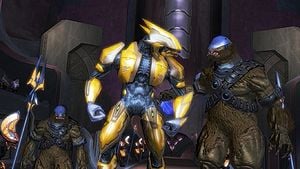
The Sangheili consider most other species to be inferior to them, both culturally and in fighting skill; this thinking has caused Sangheili to treat other species cruelly and in an arrogant manner. This eventually led to the feud between the Sangheili and Jiralhanae. Although Sangheili are naturally very intelligent, their culture's long dependence on a military-industrial scheme has led to an emphasis on might over science. In some regards, the advent of the Covenant made this position easier-allowing the Sangheili to concentrate even more mono-manically on military endeavors, while Prophets took care of science and technology. Despite this, their adeptness at using and creating technology is evident. It is probable that they designed many of the Covenant's warship types themselves. They demonstrated their superiority at space combat in the battle with the Brutes over Installation 00.
Promotion in the Covenant military is by merit; a Covenant soldier must succeed to advance among the ranks. Success is often measured in scalps. A Zealot, for example, has personally slaughtered thousands of individuals to reach that status.[20]
Raised from childhood to be warriors, other societal roles are treated as secondary endeavors or even hobbies, and are not honored at all. Elites are very skilled in most ranged weapons, as well as hand-to-hand combat. One interesting example of this martial focus is that only aristocrats are allowed to wield swords and that sword-wielders are then no longer eligible for marriage; however, they may breed with any female they choose, married or otherwise, to ensure successful transmission of "swordsman" genes. Many Sangheili children are trained in basic swordsmanship early on, both for personal development and for them to be capable of using a sword later in life if necessary.
In many ways, the Sangheili are not dissimilar to humans. They communicate, are loyal to their superiors and comrades, become protective of their troops and become angry and vengeful if other Sangheili are killed. They fear very little, taking great pride in an ancient, honor-laden code. Even when mortally wounded, the Sangheili still charge towards the enemy in a doomed last minute attack. Sangheili honor also dictates that they always be the first ones into a battle, and to never allow themselves to be captured alive.[citation needed] The more honorable captured Sangheili typically commit suicide while in prison to retain some measure of honor; often times when they are freed those who have not are executed anyway, as was the case with one of Thel Vadam's ancestors. However, escaping or staging an uprising is acceptable, by the same example. [21]
Respect and honor
The Sangheili display respect and admiration for honorable fighters, whether they are allies of the Sangheili or not. It is not unusual for the Sangheili to have such an admiration for their adversaries. Sangheili respect and revere veterans and often follow their lead. Their history is rife with victorious combatants welcoming the defeated enemies' remaining forces into their own army, provided of course that they fought with honor. During the Unggoy Rebellion, the most tenacious of the Unggoy who survived the conflict were admitted for the first time into previously all-Sangheili forces, much to the Prophets' discontent.[22] It is likely that survivors of this group of Unggoy were among the Unggoy supporting the Sangheili during the Great Schism, out of respect, and dislike of the Covenant.
The Sangheili code of honor appears quite similar to Japanese Bushido, sharing concepts such as skill in combat (with an emphasis on swordsmanship), loyalty to master and family/clan, and views on death. Both systems promote death in battle as being the most honorable and proper way to die. If a warrior is critically injured, incapacitated, or captured, the only acceptable recourse is to commit ritualistic suicide, ensuring one's honor is kept intact. This was of such import to Sangheili warriors that even if they were incapable of killing themselves, they requested the assistance of their fellow Sangheili in doing so.[23]
Superstitions
Despite their martial nature, the Sangheili have reservations to the spilling of one's own blood. This is an extension of the belief that the blood of a warrior is his essence (honor); thus, to spill one's blood is to lose one's honor.[24] As a result, in Sangheili culture, doctors are seen by many as the lowest members of society because they "..make [their] living slicing and causing another Sangheili to bleed without honor."[24] This meant that the only 'honorable' way for a Sangheili to be injured or bleed out is from combat with the enemy. This belief also makes visiting a doctor very shameful for some Sangheili.
It is believed among the Sangheili that a weapon is only to be drawn if it is to be used, because a drawn weapon "demands blood."[25]
Government
The Sangheili have no unified government; they are splintered into numerous feudal,[26] meritocratic states.[27] A given state is governed by a single clan residence and assembly house known as a keep, headed by a kaidon selected by a council of elders. There are usually a number of "client keeps" belonging to different clans under the leading keep's rule,[28] though a state's elders will assume the kaidon's clan name as a title signifying their position, regardless of the name of their own family keep.[29]
In Sangheili culture, it is customary to settle disagreements with authority by assassination, though one has to use personal weapons in order for the practice to be considered honorable.[30] For example, if a council elder believes that his vote was "ill advised" or "had second thoughts", it is considered a tradition for council elders to initiate some form of attack, such as sending assassins, against the kaidon in order "...to test the true merit of [the] ruler's martial abilities."[27] The belief was that "a kaidon who could not defend himself was not a true leader."[24] Should the attack fail, the responsible elder will be executed immediately, and his family will be killed. However, punishment for this form of heresy was usually flexible. As such, if the elder did something honorable, such as attack the kaidon himself, or attempted to make a final stand against the kaidon, then he would probably have managed to save his family from certain death, although they might still be banished.
Family
Family history and lineage are greatly valued, with each family having their own unique "battle poem" detailing the deeds and actions of its members during times of war.
Although Sangheili society is classified as being patriarchal,[2] and while most males serve as warriors, female Sangheili hold considerable power in issues within their family keeps, including political matters, civil duties and trade, while Sangheili males are sent into service as warriors. Only the females have access to records of their own bloodlines, and are able to choose their mates.[31] The maintaining of a clan's familial records is typically the duty of the wife of the keep elder.[32]
Sangheili warriors form very close-knitted relationships, referring to their comrades as "brothers" and remaining intensely loyal to them. This loyalty is shown in the custom of grieving after the death of a fallen comrade, a ritual which includes prayer for the dead warrior.
Children
Sangheili children are typically raised in the communal environment of their family keep to ensure that all start on an equal footing and progress in rank by merit of their abilities. In addition, they are not allowed to know their true fathers, and are usually raised by a maternal uncle instead. This is a method of preventing status from being inherited in order to force children to make their own way in the world so they actively work for and earn advancement.[33] However, as some children's fathers were swordsmen who were granted the right to reproduce with any number of female Sangheili they desire, the use of a maternal uncle as a father-like figure may have also been used to allow children to be raised equally. Sangheili believe that copulation without regard for the bloodline is uncultured.
Both male and female Sangheili are taught to fight from a young age. Though only males go on to become warriors, it is believed that the females should be able to defend themselves in the event their keep is attacked.[34] A popular pastime for Sangheili children is to hunt small rat-like creatures that live on their homeworld.[35]
Naming
The Sangheili place great value in names and titles, and consider names to be a privilege given only to those who are worthy. The Sangheili generally regard humans as nameless (one notable exception being the Spartans encountered in the battlefield, whom they exclusively refer to as "Demons"), and resent that the humans have assigned the label "Elite" to them (along with many other, far more derogatory names, such as squid-head, split lip, hinge-head, etc).
A Sangheili's first name is a given name that is attained at birth and persists throughout adulthood. It is followed by a family name, which denotes their lineage. Thel 'Vadam, for example, was from the Vadam lineage. Some lineages, such as Vadam, have control over their own states,[26] although this is not always the case; it is typical for Sangheili of other lineages to occupy smaller keeps in a state named after another lineage.[19][28] Family names may carry a suffix such as "-ee" (an honorific indicating that the Sangheili has enlisted in the Covenant military). Since the Great Schism, most Sangheili in the Covenant Separatist faction have dropped the '-ee' suffix.[36] Additional titles, such as "Jar" and "Nar," appear to be related to specific ranks (Imperial Admiral and Fleet Master, respectively), although this is unconfirmed. Apart from the "-ee" suffix, the suffix "-ai" denotes swordsmanship, as with Bero 'Kusovai and Toha 'Sumai.[37]
The apostrophe in front of the clan name indicates a sound resembling a glottal stop or click. [38]
Homeworld
- Main article: Sanghelios
Sanghelios is the homeworld of the Sangheili species with a population of 8.135 billion. Sanghelios is the fourth planet in a Triple Star System of stars Urs, Fied, and Joori. The planet has two Moons called Qikost and Suban. Many Forerunner artifacts exist on the planet, which are (or at least were) the topic of worship, as well as the cause of historical wars between the Sangheili and the San 'Shyuum before the formation of the Covenant.[2] Sanghelios is divided into provinces, which are subdivided into states. Each state is owned by a lineage, and everyone born in that state adopts the lineage's name as a surname. Each state is controlled by a Kaidon, who is advised by Elders.
Rank structure
Sangheili are promoted based upon their skills, abilities, and the number of casualties they inflict upon their enemy. A high-ranking Sangheili may have personally slaughtered thousands of enemies throughout his military career. Higher-ranking Sangheili wear more complex armor, much like in the Jiralhanae rank system.
| Rank/Image | Description |
|---|---|
| Cultural and Political Offices | |
Councilor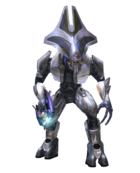
|
The Councilor was one of the highest positions attainable by a Sangheili. As members of the Covenant High Council, they shared governance with the Lesser Prophets and answered directly to the Hierarchs.[39] After the Changing of the Guard, the Councilors were taken to Installation 05, where most were murdered by the Jiralhanae. Although a number were saved by fellow Sangheili during the early stages of the Great Schism, their ultimate fate remains unknown. |
| ArbiterFile:Ripa 'Moramee.png | The title of Arbiter was originally granted to the commander of the Sangheili military, and was considered a great privilege.[40] However the conflict caused by Fal 'Chavamee in his refusal of the Covenant religion, had led the Prophets to significantly repurpose the role. In times of an extraordinary crisis, it would be reserved for the most disgraced Sangheili and offered as a means to regain their honour through suicidal missions of great importance to the Covenant.[41] The armour of the Arbiter is an ancient version of the modern Sangheili harness, featuring primitive active camouflage which can only last for a variably short period of time. |
| Ascetic | The Ascetics are a special group of Sangheili devoted to ensuring stability and purity within Covenant society.[42] At the formation of the Covenant, the Writ of Union termed the dissolution of their order. Instead they were reconstituted as an organization under the authority of the San 'Shyuum, until the renewed sovereignty of the Sangheili following the Great Schism brought the return of the Ascetics as an independent group.[43] The Ascetic armour was designed to instill confidence in those loyal whilst inflicting psychological fear in members who would undermine the Covenant.
|
| Honour Guard | |
| Light of SangheliosFile:Honor guard Ultra0111.jpg | The Lights of Sanghelios, known as Helios in short, are one of the most formidable and elite combat units of the Sangheili. They are responsible for commanding regular Sangheili Honour Guardsmen that protect the High Prophets.[44] And as result are demanded to require particularly prodigious combat abilities. Their formal name is in reference to the three stars of the Sangheili home planet.[45] Though due to being clad in the same ornate armour as the standard Honour Guard, albeit in the white colour of a Sangheili Ultra, they are colloquially known as the Honour Guard Ultra. |
Honour Guardsman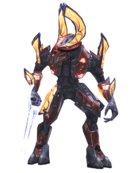
|
The Sangheili Honour Guardsmen were highly skilled warriors, hand-picked for the duty of protecting members of the High Council and the Prophet Hierarchs.[46][47] Although it was a great honour and they were expected to eliminate anyone who drew a weapon in the presence of a Hierarch,[48] the position was seen by some Sangheili as merely a ceremonial duty too removed from battle. How many existed before their service was relinquished to the Jiralhanae is unknown, yet the Sanctum of the Hierarchs on High Charity could accommodate as many as three hundred units when required.[49] They wore highly ornate armour; a maroon harness with glowing orange spikes and pauldrons, despite previous iterations being more simple.[50] |
| High Commander | |
| Imperial Admiral | The Imperial Admiral's commands the combined fleets of the Covenant. The only known Admiral is Xytan 'Jar Wattinree. |
Sangheili Field Marshal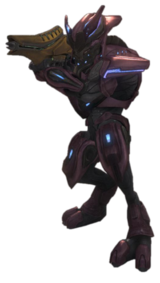
|
The rank of Field Marshal is a very high position within the Zealot class. Besides leading large-scale ground operations, Field Marshals are known to lead small strike teams composed of lower Zealot officers. |
Zealot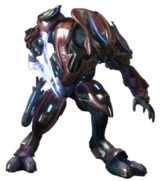
|
The Zealots are a group of religiously devout high-ranking warriors which often serve as field commanders or strike teams operating separately from the rest of Covenant military. |
General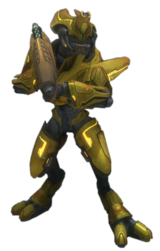
|
Generals command specific groups of infantry on the battlefield, and also command ships. "General" may simply be a human-given name for the rank of Field Master, given their similar roles. |
| Special Operations | |
Special Operations Commander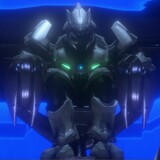
|
The Special Operations Commander is in charge of a Covenant fleet's Special Operations division.[51] Special Operations Commanders occasionally receive missions personally from the Hierarchs. The only Sangheili known to hold this rank is Rtas 'Vadum. |
Special Operations Officer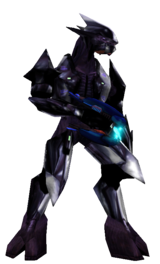
|
Wearing pitch black armor, the Special Operations Officers, also known as commandos, lead Standard Special Operations Sangheili and even Special Operations Unggoy. |
Special Operations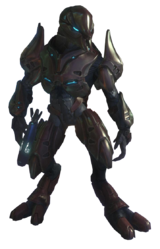
|
Special Operations Sangheili are extremely skilled fighters, sent in by the Covenant to accomplish the most dangerous and difficult of missions. They have superior accuracy and have slightly stronger shielding than their regular Sangheili counterparts. Most notably, SpecOps Sangheili operate in squads, are extremely skilled and are accurate grenade throwers. They are equipped with an active camouflage system, but rarely use it, except to get into position without being noticed though they have also been known to sometimes operate similarly to Stealth Sanghelli using camo during battle. They often lead Special Operations Unggoy in combat. |
| Specialists | |
Stealth soldier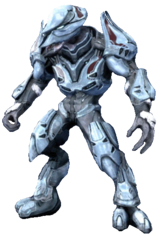
|
The Stealth Sangheili are the Covenant's covert assault units. They use active camouflage technology, as the Special Operations Sangheili do. They are often used in ambushes. Members of this rank wear either unshielded light blue armor or shielded brown armor. |
Ranger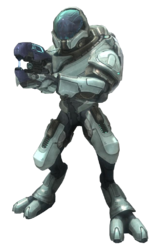
|
The Rangers are a voluntary group of Sangheili that work in the least forgiving environment of all: vacuum. Their helmets completely encase their heads, protecting them from the vacuum of space. They wear one of two suits that are optimized for zero-gravity, non-atmosphere combat, some of which similar in appearance to the Sangheili flight harness, the others having a large, transparent faceplate. Their armor is either cobalt or silver. They can pose a substantial threat, due to their unique movement options. There are also variants that use their equipment to give them a tactical advantage planet side, flying above and shooting from the air, confusing and demoralizing the enemy, similar to a Yanme'e, but with more power and fewer numbers. |
| Regular infantry | |
Ultra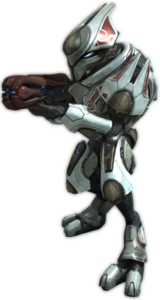
|
Ultras preside over individual military operations, commanding multiple squads of Sangheili, Unggoy and Kig-yar. As befits their important role, they are equipped with powerful shields and armor, and are generally stronger and more intelligent than lower ranks. |
Major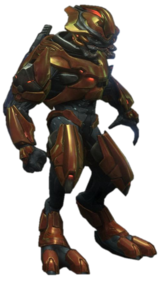
|
These veteran Sangheili warriors hold the ranking equivalent of a UNSC lieutenant. Overall they are more agile, more accurate, and more aggressive than Minor Sangheili and seldom make tactical mistakes in combat. A single Major Sangheili can hold its own against an entire squad of UNSC Marines. They usually lead Unggoy, Kig-yar, and Minor Sangheili into battle.
The Major rank also incorporates a subclass known as "Officer" (pictured left). There are no substantial differences between "regular" Majors and Officers other than the more ornate set of armor worn by the latter.[52] |
Minor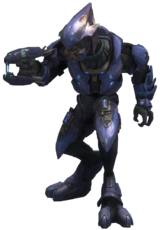
|
The most common and least experienced Sangheili, Minor Sangheili are nonetheless skilled warriors. They possess shields that are weaker than those of Sangheili Majors. Along with Majors, they often lead files of Unggoy or Kig-yar into battle. |
Other ranks and titles
The Supreme Commander appears to be the Covenant equivalent of the human "Commander-in-Chief". The only known Supreme Commander was Thel 'Vadamee, who commanded three fleets during the Fall of Reach, while serving as fleetmaster of his own Fleet of Particular Justice, which he took to Installation 04.
Fleet Master is a title given to a high-ranking Sangheili in command of a fleet, though they do not command armadas as massive as those led by Supreme Commanders.
Shipmasters are Sangheili command individual ships, though they sometimes command small task forces, as well. The term "Shipmaster" is not exclusive to Sangheili, and is universally used by the Covenant to refer to an individual of any species in command of a starship.
Field Masters are Sangheili who lead land-based armies, though they do not rank as highly as Field Marshals.
Kaidons are leaders of particular States on Sanghelios, and the heads of their lineages. They are advised and elected by a council of elders. They may also serve in the Covenant military, though kaidon does not appear to be a military rank.[24]
Oracle Masters are apparently advisors to the High Council and to the High Prophets, specializing in intelligence gathering and providing religious counsel to high-ranking Prophets and Sangheili Councilors.
Aristocrats are important members of Sangheili society, allowed to wield energy swords. They are unable to marry but are allowed to mate with any female, married or unmarried, to "pass on the genes of sword fighting and the nobility." Aristocrats can hold nearly any military rank. [2]
Ossoona, a term that translates as "Eye of the Prophets", are Sangheili who are used as special-purpose espionage agents. They are not properly equipped for heavy combat, as they are intended for information gathering on enemy weapons and military data.[53] One of the major items of information the Ossoona were tasked with discovering was the location of Earth.[53] It is a temporary rank only granted to those who have attained at least the rank of Major, the reason being that a Minor's lack of experience could cause them to be very easily compromised or that they may abandon the mission outright in pursuit of personal glory. It is not given to Sangheili of higher rank because they are considered too valuable and would rather engage in combat.[citation needed] The only known Ossoona was Isna 'Nosolee.[53]
The Sangheili Commando unit is a branch of the Special Warfare Group based upon pre-contact ground forces. Sangheili Commandos possess hardened communication gear and up-link capable equipment that an ordinary Sangheili wouldn't have access to. Their armor is streamlined for better maneuverability in close encounters. The armor is lightweight and advanced internal equipment increase the overall effectiveness of an individual Sangheili.
- Prison Guard
Prison guards, as their name suggests, provide security for Sangheili prisons such as Weeping Shadows of Sorrow.
Weapons Masters are Sangheili engineers who maintain and improve equipment used by the Covenant.
Heretic rank structure
- Leader
Sesa 'Refumee, the leader of the heretics, wore armor that was modified from a standard combat harnesses, featuring body pieces with modified shapes and designs in shades of red and upgraded with a Sangheili Ranger's thruster pack. This gave him a unique advantage in combat, but it was not enough for him to defeat Arbiter Thel 'Vadamee, who slew him during the Battle of the Gas Mine.
Heretic Majors served as the commanders of the heretic Unggoy and heretic Sangheili Minors. They wore gold-colored heretic armor and were equipped with Covenant carbines and Sentinel Beams. A select few wielded energy swords. While not so skilled in the energy swords use as Sangheili Honor Guardsmen, Councilors, Zealots, or Ultras, they were quite dangerous due to their crafty flanking maneuvering and teamwork with other heretics.
Heretic Minors were the file leaders of the heretic Unggoy. They wore brown heretic armor and wielded Covenant carbines and, occasionally, Sentinel Beams. They had superb accuracy, far superior to normal Sangheili Minors. Many were skilled Banshee pilots who flew in pairs, supplementing their effectiveness.
| |||||||||||||||||||||||||||||||||||
Trivia
Template:Quotes Link Template:Gameplay link
- The dialogue spoken by the Sangheili of Halo: Combat Evolved was made by reversing and slowing sound clips of Sergeant Johnson. "Wort! Wort! Wort!" is the reversed phrase, "Go! Go! Go!". With the IWHBYD Skull turned on in Halo 3, they will occasionally say their trademark, "Wort! Wort! Wort!".[citation needed]
- Jason Jones at first wanted the Sangheili to have tails, but Shi Kai Wang talked him out of it by arguing that the Sangheili would look too animalistic, as opposed to being an intelligent race. An additional point was that when the Sangheili sit, the only place their tails could go was folded between their legs, creating a seriously awkward appearance.[54]
- Sangheili culture is comparable to that of the ancient Spartans of humanity's past. Rank is achieved by success, and much of their lives revolve around war.
- It is mentioned in Ghosts of Onyx that Sangheili would rather die with their weapons out of energy than pick up fully loaded human weapons, yet they show no shame when they obtain them in Halo 3 and Halo 2. They will sometimes even thank the player when handed a powerful human weapon such as the Rocket Launcher. This is likely because they are Covenant Separatists, and no longer view humans as heretics, nor their weapons 'unclean'.
- Although the player is not able to dual wield in Halo: Reach, Elites are occasionally seen dual wielding Plasma Rifles.
- In Halo: The Fall of Reach, a Sangheili is said to have green blood when it has been purple in all game appearances to date. [55]
- The Elites are the first Covenant species the player encounters in most of the Halo games: when you make your way to the bridge of the Pillar of Autumn in Halo: Combat Evolved, at the trial of the Thel 'Vadamee in Halo 2, and in the opening cut scene of Halo 3. In Halo Wars, they are seen in the first cutscene during a battle on Harvest fighting against UNSC Marines. In Halo: Reach a camouflaged Elite can be found at the beginning of the Winter Contingency, though only on Legendary or it will not appear.
- There has been a running inconsistency in the franchise regarding when humans first encountered the Sangheili. According to the original edition of Halo: The Fall of Reach, Elites had not been deployed to combat against the UNSC prior to the Fall of Reach when John-117 encountered one above Reach.[56] However, this has been abandoned in newer sources, most of which depict Sangheili being active in the field for most of the Human-Covenant War. Finally, the 2010 reprint of The Fall of Reach altered the references to the Sangheili being a "new" species to human forces, removing this discrepancy.
- In Halo: Combat Evolved, the Sangheili have two different types of helmet appearances. One is the classical shark-like helmet with the pointed cone at the peak of the helmet. The second is slightly different with a wide, crest-like and curved upper piece on the helmet instead of the classical conical helmet.
- An exclusive set of Sangheili Officer armor is included with the Limited and Legendary editions of Halo: Reach.
- In Halo 3, Sangheili pupils turn to vertical slits upon death, whereas they are circular and centered when they are alive. This is because they have horizontal eye-lids, which can be seen when they blink, and this is simply their eyes closed while dead.
- In Halo: Reach, the Sangheili HUD compass has Covenant markings instead of cardinal directions. Sangheili night vision is also purple, as opposed to the green used by Spartans. However, Sangheili night vision is only available in Firefight Versus, when playing as Elites. The Sangheili HUD also features a target tracking system.
- Over the course of development for Halo Wars, the Sangheili character model used in the cinematics went through at least 2 revisions. The initial version seen in the announcement trailer was later revised, being far closer in size, proportion, and overall physiology to the portrayal of the species in Bungie's games than the version in the trailer.
Voice talents
- Keith David - Thel 'Vadam (Arbiter)
- Robert Davi - Rtas 'Vadum (Special Operations Commander)
- David Scully - Sangheili (in Halo: Combat Evolved, Halo 2, Halo 3, and Halo: Reach)
- Miguel Ferrer - Sesa 'Refumee (Heretic Leader)
- Norm Woodel - Sangheili (in Halo 2)
- Ron Hippe - Sangheili (in Halo 3)
- David Sobolov - Ripa 'Moramee (Arbiter), and Elites (in Halo Wars)
Gallery
- Early Elite Study.jpg
An early Elite study.
- E32000.png
An early Elite during Halo's production in 1999.
- Early Elite.jpg
Another screenshot of Elites during Halo's production.
- Sangheili concept.jpg
Revised concept for Halo: Combat Evolved
A Zealot prepares to lunge.
- Shade.jpg
A Minor Sangheili fires at enemies with a Shade from Halo: Combat Evolved.
- Ossoona.jpg
An Elite multiplayer character model from Halo 2.
- 1208527543 Elites standard 2.jpg
An Elite multiplayer character model from Halo 3.
Sangheili Honor Guards wearing a different type of ceremonial armor from Halo Legends' The Babysitter.
A size comparison of an Elite from Halo: Reach and a SPARTAN-III.
A Sangheili readying an arm-mounted energy blade.
The model of an armorless Elite as seen in Halo: Reach via a hologram glitch.
- Elitesv3.png
The current elite armor permutations/ranks available for Halo: Reach.
- ReachConcept-Elite.png
Concept art of a Sangheili for Halo: Reach, showing some planned anatomical features such as the additional claws or the skin braids.
- ReachConcept EliteMinor.png
Halo: Reach concept art of a Sangheili Minor.
- ReachConcept EliteOfficer.png
Halo: Reach concept art of a Sangheili Officer.
- 1771872-gallery.png
Concept art of a Sangheili in Halo Legends: Homecoming.
The Sangheili as they appear in Halo Legends: Origins.
Notes
- ^ It was mentioned that "even the smallest humans hurl themselves against our defenses with honor. If only the Unggoy were as committed." This shows that humans have earned the grudging respect of a few Sangheili. They claimed variously that humans are "tenacious", that their technology is "limited, but...useful", that their battle techniques are "impressive", and that they are "excellent strategists".
Sources
- ^ Halo: Ghosts of Onyx, page 189 ("Sangheili: the Elite name for their race")
- ^ a b c d Bestiarum
- ^ Bungie.net: Halo: Reach: Enemies - Elite
- ^ The Official Halo 2 Strategy Guide, page 43
- ^ Halo 2, campaign level Delta Halo
- ^ Conversations from the Universe, Sangheili Conversation
- ^ Halo: Evolutions - From the Office of Dr. William Arthur Iqbal
- ^ Halo: Glasslands, Chapter 2, page 53
- ^ Halo: Glasslands, Chapter 1, page 20
- ^ Halo: Evolutions - The Return
- ^ Halo: Glasslands, Chapter 1, page 66
- ^ Cite error: Invalid
<ref>tag; no text was provided for refs namedVIS - ^ Cite error: Invalid
<ref>tag; no text was provided for refs namedLibrary - ^ Halo Wars: Genesis, page 7
- ^ Halo Graphic Novel, page ??
- ^ Halo: Contact Harvest, page 201
- ^ Halo: Ghosts of Onyx, page 226
- ^ Halo Encyclopedia, page ???
- ^ a b Halo: Blood Line, Issue 3: "Reff and I hatched on (sic) the city-state of 'Thasanee."
- ^ Bungie.net: The Covenant Primer
- ^ Halo: The Cole Protocol, pages 170, 195-196
- ^ Halo: Contact Harvest, page 151
- ^ Halo: The Cole Protocol, page 170
- ^ a b c d Halo: The Cole Protocol, page 143
- ^ Halo: The Cole Protocol, page 138
- ^ a b Halo: The Cole Protocol, page 93
- ^ a b Halo: The Cole Protocol, page 89
- ^ a b Halo: Glasslands, page 94
- ^ Halo: Glasslands, page 57
- ^ Halo: Glasslands, page 93
- ^ Halo: Glasslands, page 52
- ^ Halo: Glasslands, page 91
- ^ Halo: Glasslands, page 321
- ^ Halo: Glasslands, page 54
- ^ Halo: The Flood, page 5
- ^ Halo Encyclopedia, page 126
- ^ Halo Encyclopedia, page 125
- ^ Halo: Glasslands, page 326
- ^ Halo 2, campaign level The Heretic
- ^ Halo Legends, The Duel
- ^ Halo 2, campaign level The Arbiter
- ^ Halo 3, armour preferences
- ^ Halo: The Essential Visual Guide, page 56
- ^ Halo 2, campaign level Gravemind
- ^ Halo: Contact Harvest, page 153-154
- ^ Halo: Contact Harvest, page 381
- ^ Halo: The Essential Visual Guide, page 95
- ^ Halo: The Cole Protocol, page 341
- ^ Halo: First Strike, page 339
- ^ Halo Legends: The Babysitter
- ^ Halo: The Essential Visual Guide, page 175
- ^ Halo Encyclopedia, page 135 (2011 edition)
- ^ a b c Halo: The Flood, Page 28
- ^ The Art of Halo, page 23
- ^ Halo: The Fall of Reach, page 327
- ^ Halo: The Fall of Reach (2001), pages 242, 309
